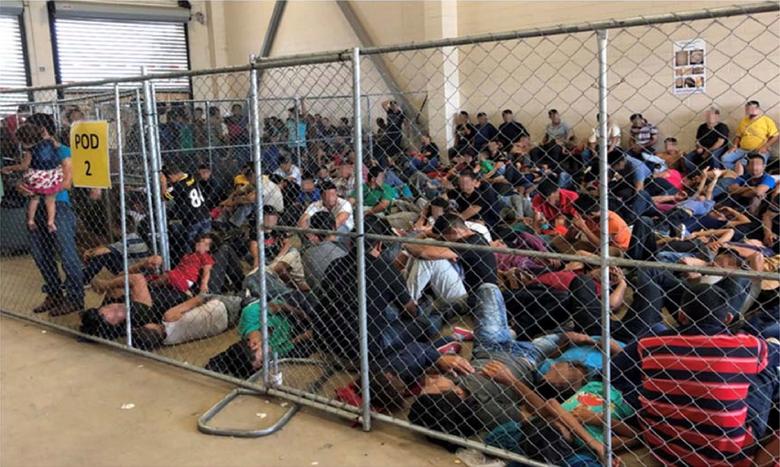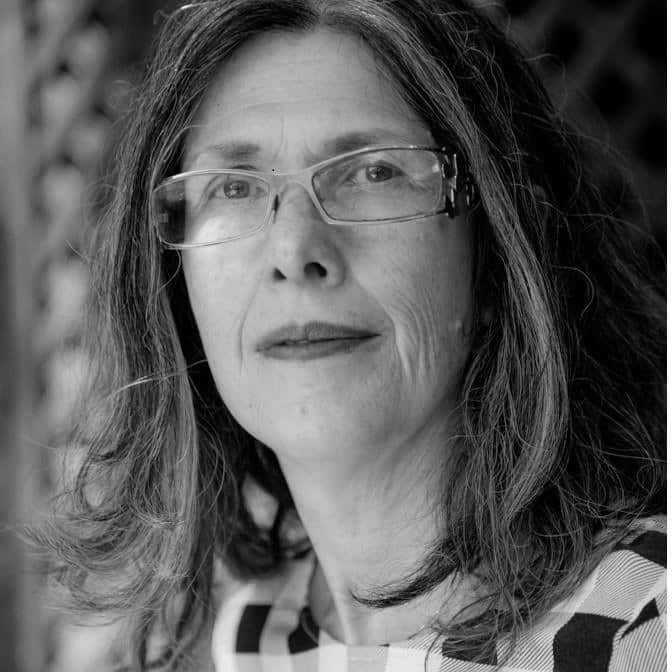 An overcrowded fenced area holding families at Border Patrol McAllen Station is seen in a still image from video in McAllen, Texas, on June 10, 2019. Picture pixelated at source. Office of Inspector General/DHS/Handout via REUTERS
An overcrowded fenced area holding families at Border Patrol McAllen Station is seen in a still image from video in McAllen, Texas, on June 10, 2019. Picture pixelated at source. Office of Inspector General/DHS/Handout via REUTERS The rideshare dropped me off 15 minutes early at the Metropolitan Detention Center in downtown Los Angeles. Already, there were hundreds of people standing in witness. There would be thousands by the Lights for Liberty vigil’s end.
A voice filled the air, that of a black woman backed by a choir: “Won’t let nobody turn me around, turn me around, turn me around. Won’t let nobody turn me around, got to keep on walking, keep on talking, marching to the freedom land.”
The light began to turn ruddy, caressing our faces with its blush. We were there for the people held in the tower behind us and in camps at the border and deep within our country; for children who don’t understand why they are not allowed to brush their teeth, why they are always hungry, why their parents no longer come when they call. For the children who have stopped calling.
We heard the testimony of a young woman whose parents had come to this country in desperation, without documentation, who is now an immigration attorney giving back through our justice system. We heard a teenage boy who said he did not know that he could be as cold as he became all those nights sleeping on a concrete floor, curled around his younger brother, trying to keep the child warm. This young man whose family found him and who is now in school has his own dream of becoming a lawyer — or, perhaps, a U.S. fighter pilot.
This testimony touched stories and memories within my Jewish soul.
We heard from a child psychiatrist who assured us that the brains of traumatized children will always be marked. They will never be the people they might have been had they not endured the bewildering terror of being herded into packed pens of human beings; of inhaling for days and weeks the smell of human beings denied sufficient water to wash or sanitary napkins to contain their blood; of learning to accept hunger as a constant, nights of fitful, haunted sleep, and the realization that it’s better not to complain, because complaining could mean that someone will take away some meager comfort, like a Mylar blanket that had been given provisionally, not for care but for something to lose. She spoke of people handled and warehoused like detritus to be stored in advance of disposal.
This testimony touched stories and memories within my Jewish soul.
It was Friday, so Shabbat was approaching. Just before sundown, in those last hours when public grief was permitted, my friend Rabbi Susan Goldberg invited us to let in the truth. To allow the horror and outrage, the pain that right then reverberated out of the detention center, out of the camps, to touch our souls. To feel the loss of each of the 24 human beings who have died in U.S. Immigration and Customs Enforcement custody since President Donald Trump took office. Muslim writer Sarah Alkutb spoke the names of each of the dead, and we responded:
Roxana Hernandez. Presente!
Kamyar Samimi. Presente!
Carlos Bonilla. Presente! Abel Reyes-Clemente, Medina Leon, Mariee Juarez … they are here!
Then it was time to call in Shabbat. Goldberg asked me to light the candles. All those gathered raised our candles high (battery powered candles for safety). And something extraordinary happened. Through the slits of window in the tower that rose above our heads, we saw lights flickering in answer. “No estan solos,” we cried, “You are not alone!”
Later, a group of Jews circled to pray the Shema and the Mourner’s Kaddish and to share why we were there. Each of us had an ancestor who had come to the U.S. as a migrant or refugee, fleeing pogroms or the Shoah or simply poverty. One man’s grandfather had been born in a detention camp just after World War II. We remembered the MS St. Louis, a boatload of Jewish refugees from the Shoah who were denied entry and sent back to Europe to die.
We prayed to be the neighbors our ancestors had prayed to find.
Rabbi Robin Podolsky teaches Jewish thought at California State Long Beach.























 More news and opinions than at a Shabbat dinner, right in your inbox.
More news and opinions than at a Shabbat dinner, right in your inbox.